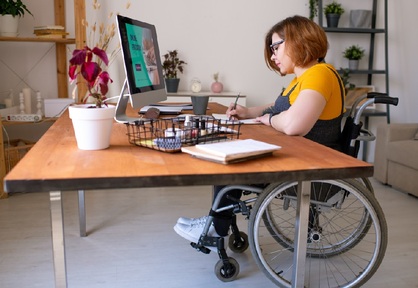Union calls on government to change flexible home working conditions for disabled people
The TUC is calling on the government to change the law where all future advertisements of jobs come with a legal right to work flexibly from home, after 90 per cent of disabled workers said home working has had a positive impact on them during the pandemic.

The TUC say enabling flexible working practices can be a “reasonable adjustment” and should be considered to support disabled workers after the pandemic ends.
In a recent survey produced by YouGov poll for the TUC, it found 63 per cent of disabled people said working from home has given them greater control over their working hours, while two-fifths said it had reduced their tiredness and fatigue and more than a quarter (26 per cent) said their mental health had improved.
TUC general secretary Frances O’Grady said: “Ministers must change the law so that all jobs are advertised with flexible options clearly stated, and all workers have the legal right to work flexibly from their first day in a job.
“Disabled people were hit hard by Covid-19. Six in ten of all Covid deaths were of disabled people."
The TUC say disabled workers still face barriers to getting and keeping a job – and are often paid less than their non-disabled peers
Since the beginning of the pandemic in March 2020, the union say that not all companies have managed the transition to working from home well enough.
The survey shows that just over half of disabled workers who asked their employers for reasonable adjustments during the pandemic said this request had been made in full.
One third said they lacked proper office equipment such as a desk, chair or computer and nine per cent experienced difficulties taking part in online meetings because of their disability, impairment or health condition with a further one in 14 (seven per cent) saying they lacked the software they needed to do their job – such as speech to text programmes.
Ms O’Grady said: “During the pandemic, many disabled people were able to work flexibly or from home for the first time – often after being previously told that it was not possible in their job. Even amid the grief and isolation of the pandemic, these changed working patterns improved the experience of many disabled people at work.”
The TUC is also calling on the Equality and Human Rights Commission (EHRC) to update their statutory Code of Practice on disabled people and employment, so it includes more examples of what timely implementation of reasonable adjustments looks like and reflects the advances in home and flexible working during the pandemic.
An EHRC spokesperson said they already have clear guidance for employers on how to make reasonable adjustments for their staff, including home working and said working from home should be a “day-one right for everyone.”
Latest News
 29-Jul-24
Dementia Bus gives carehome.co.uk staff insight into life with dementia
29-Jul-24
Dementia Bus gives carehome.co.uk staff insight into life with dementia
 27-Jul-23
UK's top home care agencies in 2023 revealed
27-Jul-23
UK's top home care agencies in 2023 revealed
 30-Nov-22
A quarter of older people keep their falls secret from family
30-Nov-22
A quarter of older people keep their falls secret from family
 29-Nov-22
'Covid-19 has not gone away' say terminally ill
29-Nov-22
'Covid-19 has not gone away' say terminally ill
 28-Nov-22
IT consultant who received poor care opens 'compassionate' home care business
28-Nov-22
IT consultant who received poor care opens 'compassionate' home care business